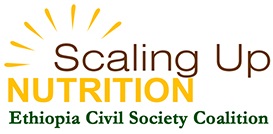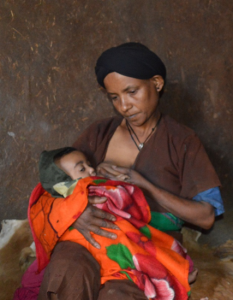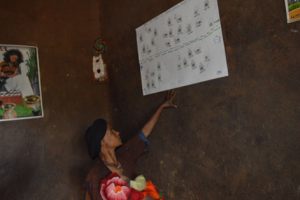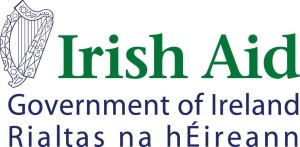Household’s Experience to Tackle Malnutrition – East Gojam Experience, Ethiopia
Ethiopia Civil Society Coalition for Scaling up Nutrition (ECSC-SUN)
Bayush Beyen lives in Qerer kebele, a rural kebele in Machakel woreda of the Amhara Regional State. She has seven children with the last one only three months old. She remembers that during her previous pregnancies, she used to eat little food to avoid having a big baby in her womb and facing difficulty at birth.

About the authors: This article was documented and shared by Kenaw Gebreselassie and Sosina Melese- Ethiopia Civil Society Coalition for Scaling up Nutrition (ECSC-SUN)].
Bayush Beyen lives in Qerer kebele, a rural kebele in Machakel woreda of the Amhara Regional State. She has seven children with the last one only three months old. She remembers that during her previous pregnancies, she used to eat little food to avoid having a big baby in her womb and facing difficulty at birth. After she had given birth, she did not take good care of her kids: she did not feed them colostrum; she did not exclusively breastfeed them during the first six months. She invariably used to feed them diluted cow milk and gruel.
As Bayush’s exposure to messages on health, child and maternal feeding, hygiene and sanitation increased with her frequent visits to nearby health post for different services, she realized the importance of maternal and child feeding. As a result, she prepared homestead gardening, which is now full of different types of vegetables, such as cabbage, carrot and beetroot, ‘all have been consumed at home, and will be consumed at home.’’ Bayush said.
In addition, she started keeping cows and sheep for milk and meat consumption for her family. She consumed vegetables, fruits, meat, milk and cereals during her later pregnancies. Her last child, a baby girl, is luckier than her siblings as she is being exclusively breastfed. After six months, Bayush said, she will still feed breastmilk and begin to feed her baby porridge enriched with animal products and vegetable from her garden. She has already experienced this as she had been giving similar food to her fifth child, who is now 4 years old daughter.
“You can go around and speak with mothers like me; you will witness the changes on child feeding and care, sanitation and health seeking practice, which we did not give attention to some years ago. Nutrition education is an integral part of the everyday lesson in the health posts we visit regularly. This is the time of enlightenment; every household is keen to know and be well informed about what to do during pregnancy and after. How to feed children has not been on the menu of health communication and education.’’ She asserted.
Bayush is branded as a ‘model family’ from which other women in her surrounding, even a woman of other localities learn good experiences.
House Setting
Bayush’s house is of a quality her neighbours become envious of. It is separated from the kitchen and animals closure, which we cannot find in many of the rural settings in Ethiopia. The rooms are all neat and orderly with a shower, a toilet and hand-washing facilities close-by. The family fetches water from spring and wells. She boils the water before drinking, and as a result none of her kids has been seriously ill due to any water borne diseases. Bayush believes these facilities contribute to improved nutritional status of her children and herself.
The Role of Her Husband
Alem Abebe, Bayush’s hasband, is a priest and a farmer. He supports his wife in various ways. He takes care of the kids as much as Bayush does. He washes and feeds them. He fetches water. He generates the entire income of his family and has never been reluctant to give money for the purchase of whatever is required for his children’s nutrition.
One of the challenges believed to adversely affect the nutrition of children in Amhara region is during fasting period such animal products as egg, meat and milk are not consumed. These food items are barley served even for children under 5 years old. Priest Alem is among the few who encourages consumption of these foods by children. He even goes educating others that his religion (Orthodox Tewahido Christian) does not ban followers from preparing and giving these food items to children if they are below 7 years old.
“I am a priest and I myself feed my kids egg, milk and meat. I also urged my wife to eat when she was pregnant and now as a lactating woman during fasting time. Religiously, there is nothing wrong with this. The problem is that we lack awareness of the religious teaching and what it says about who has to eat these food items and who hasn’t.’’ Priest Alem pronounced.
Bayush as a Leader of Women Development Army
Going beyond the welfare of her family, Bayush is trying to have an impact on her community members. She leads volunteers who formed Women Development Army of 30 members (representing 30 households), structured under 1 for 5 development network. Having been identified as a woman of model family by the Woreda administration, she volunteers to lead and educate others. She participates and facilitates the Army’s weekly meeting where members discuss issues relating to child and maternal feeding, hygiene and sanitation, immunization of children, and delivery of mother at the health facilities.
Bayush shares her good experiences with her peers and causes the villagers to compete positively with one another, and even with herself, for better performance.
Bayush looks up her map she has posted on the wall of her house. The map shows where the families she checks up on are located. Following her schedule, she then goes door to door, watches the status of pregnant women, status of those who breastfeed and those who commenced feeding their children additional diet. She does this to see if something goes wrong in any of the households under her eyes, and get any pitfall fixed with the support of the devoted Health Extension officers and other nutrition and health relevant sector offices operating in her localities. Good performing households are praised and their stories are used to motivate others.
Bayush’s family and other model families at Qerer are influencing members of their community to follow suit, and the changes seen at the community level are remarkable. Bayush is a role model for many rural mothers in her community. She could still be branded as a model for millions of rural mothers in Ethiopia.
The Ethiopian Civil Society Coalition (ECSC) was established in 2013 in order to galvanise efforts to alleviate the burden of malnutrition. The ECSC-SUN is chaired by Save the Children and funded by IrishAid.



